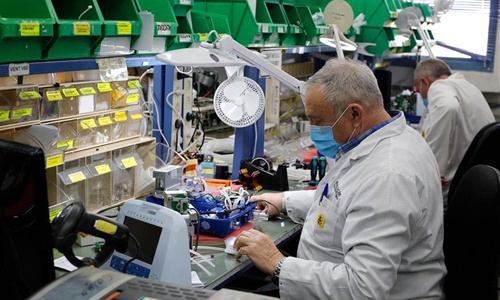Israeli businesses remain eager for Chinese market despite mounting pressure from US
By Zhang Hongpei Source:Global Times Published: 2020/6/16 16:38:40 Last Updated: 2020/6/16 19:38:40

Israeli engineers work in a production line of ventilators in the central Israeli city of Petah Tikva amid COVID-19 pandemic, on April 7, 2020. Israel reported eight new death cases from the COVID-19 on Tuesday, bringing the death toll to 65, the state's Ministry of Health said. (Photo by Gil Cohen Magen/Xinhua)
Bilateral business activities between China and Israel have been making progress despite the COVID-19 pandemic disrupting normal communications, and the two sides are looking forward to strengthening cooperation and business expansion in the post COVID-19 period.
The close business ties between China and Israel, particularly in the high-tech sector, won't be dented by the US, business representatives and experts told the Global Times.
Addressing a virtual American Jewish Committee (AJC) conference on Sunday, US Secretary of State Mike Pompeo once again made absurd comments on China, saying China is "a growing challenge to the US and Israel," according to the Jerusalem Post.
During a visit to Israel in May, Pompeo warned Israel against Chinese participation in infrastructure projects, citing "security concerns."
"Over the past few years, he has been labeling Chinese products, investments and personnel as 'security risks' without producing any concrete evidence," the Chinese Embassy in Israel responded in May.
Regardless of external chaos, Israeli firms are betting on positive economic ties between China and Israel.
Eli Assoolin, CEO and co-founder of Israeli start-up Newsight Imaging, told the Global Times on Monday that the company is not experiencing any influence from the US.
"No worldwide politics are stopping us," Assoolin said.
"Israel is an independent country and its government is committed to Israeli civilians and residents as first priority. Personally, I do not see a scenario in which Israel is forced to change its attitude to China," said Assoolin, who believes positive China-Israel relations will continue for a long time.
Newsight Imaging is a CMOS image sensor chipmaker for 3D machine vision and special analysis applications. As an Israeli firm with Chinese investors, its intellectual property is registered in the US and it sells products both to the US and Chinese markets.
During the COVID-19 health crisis, the start-up created a prototype device capable of identifying viruses in seconds using only light, with an accuracy rate of or close to 100 percent.
"This brought us an immediate strategic investor from Hong Kong, China, that licensed our technology and now is building a business of developing and selling portable virus detector devices based on our technology," Assoolin said.
Useless warning
As a world-renowned country of innovation with more than 6,000 high-tech start-ups and over 350 research and development (R&D) centers funded by multinational companies, Israel has been attractive to Chinese investment over recent years.
From 2016 to May 2020, Chinese investors provided $1.43 billion in financing for Israeli tech companies, according to the IVC Research Center in Tel Aviv. In 2018, Chinese investors made direct investments in 12 percent of local funding rounds, compared to 7.5 percent to 9 percent for the three years prior.
Big Chinese firms including Ping An, Alibaba, Baidu and Lenovo Group have significantly invested in many Israeli companies and venture capital funds.
Benjamin Peng, founder of the Israel Plan Organization (IPO), a non-profit organization focused on promoting and supporting Israel in China, told the Global Times Monday that cooperation with Israeli high-tech firms would be a good substitute for Western companies as China is faces deliberate blocks on several Western fronts.
"It is anticipated that more Chinese firms will come to invest in Israel and establish their R&D centers," said Peng.
Such increasing enthusiasm from Chinese investors has drawn attention from Washington, which is sending warnings to Israel with the aim of alienating China-Israel ties.
Zhou Rong, a senior research fellow at the Chongyang Institute for Financial Studies at the Renmin University of China, told the Global Times on Tuesday that Israel holds a critical position for the US to the extent that the US is reluctant to harm Israel's interests, which include the latter's cooperation with China.
"It is the US which is wooing Israel rather than the other way around, therefore the Israeli side won't care too much about the US' concerns," said Zhou.
"US-China tensions might mean Israel has reservations in some aspects, but it will absolutely not mean Israel will flinch from its ties with China," he added.
Despite the impact of the COVID-19 pandemic and the US' pressure, bilateral trade and investment activities are on the increase.
China-Israel bilateral trade rose 18 percent year-on-year in the first four months of 2020, hitting $4.87 billion, customs data showed. Double-digit growth against the backdrop of COVID-19 and a global trade tumble showcases the high complementarity of the two countries' economies.
Amir Gal-Or, president of the China-Israel Chamber of Commerce, said that "investments between China and Israel are in process, continuing at accelerated paces from where they stopped in February. There are deals going on via video conferences."
The quantity of investments may, however, decrease due to the COVID-19 pandemic which has halted mutual visits and face-to-face meetings, Gal-Or told the Global Times on Monday.
He said that China and Israel have mutual interests in areas such as food tech, the environment, medical devices and education, and that the outlook of bilateral cooperation in those sectors in the coming years is very positive.
According to Peng, remote medical care and education are two promising areas with huge potential where China and Israel could join hands.
But another trend in bilateral economic ties, Peng said, is that high-end mergers and acquisitions by Chinese capital could meet some obstacles in Israel.
Posted in: ECONOMY,BIZ FOCUS